In the last few months I have read a few news stories regarding the UK police treating photographers like criminals, by telling them that they are not allowed to take photographs, even when the photographers have clearly not been taking pictures of any items related to national security.
It would appear that many police offcers are ignorant of the laws applicable to photography, as there have been many recent cases of photographers having their photos deleted or memory cards seized.
This must stop, and a clear statement needs to be made to the police and citizens, so every police officer and photographer knows what is allowed, and what is not.
It would appear that the UK government / police are deliberately trying to whip-up a climate of fear and suspicion against photographers, supposedly in the name of protecting society. Just take a look at a classic example of this absurdness:

The wording mentions about the need to report anyone, like terrorists, taking pictures of things like CCTV cameras. The irony is that due to the paranoia within the UK, it’s now just about impossible to take a picture in London that does not contain a CCTV camera, as estimates of 500,000 cameras in London alone have been made, or one camera for every 14 citizens (4.2 million for the whole UK).
So you see the problem now of not having a CCTV camera in your photos?
It would appear that the campaign targets photographers with decent cameras like digital SLR’s. Could it be because the rise in affordability, and therefore ubiquity, of these decent cameras, is worrying to the authorities for some reason?
With the UK having the most CCTV cameras of any place in the world, the government obviously likes using them everywhere in an attempt to film anything that moves. Could it be that the government is concerned now that the public has more cameras than themselves?
As The Register points out:
The irony, of course, is that anyone taking photos in preparation for a terrorist atrocity would most likely be discreet. They would use small or mobile phone cameras. Yet those who have been stopped have frequently been individuals with serious high-powered SLR equipment. Have the police not thought this through? Or do they suspect terrorists of running some form of elaborate double bluff?
After the U.S. 9/11 and UK 7/7 events, nobody can deny that a small number of terrorists do bad things but, again, we need to prevent paranoia infecting normal everyday activities like photography, and take a reasoned approach and, above all, make a clear statement about what is allowed to be photographed and what is not, so everyone is reading from the same page.
Until that happens, UK photographers need to be aware of the government / police paranoia surrounding them, and to expect to be challenged by a police officer, who will quite possibly be ignorant of the law regarding photography. It might be useful to print out and carry with you some legal text relating to the laws on photography, so you can (1) show the officer that you know the law, and (2) can demonstrate that you are doing nothing illegal. Then again, so they say, nobody likes a smart ass, so maybe that will not be appreciated by the officer, but what else can you do — risk having all your photos seized or deleted by some well-meaning, but ignorant Jobsworth?
Now then, I’m off to look for this legal text… if I find it, I’ll post a reference to it here. In the meantime, I found this, which seems helpful: UK Photographers Rights.
Also, I really must read the book ‘1984’, as I keep being reminded that many things like these events are the kinds of things that George Orwell wrote about such a long time ago…
Could this be the real reason the police have a problem with use of cameras in public places? I.e. they don’t like the ability of the public using cameras to show the police themselves in a bad light?
Public spaces, by definition, will contain members of the public. It seems to me that in a world of increasing legislation and attempts by government to control the public using ever more general and probably deliberately vague and all-encompassing legislation, the public is getting more and more irritated, and so this inevitably leads to increasing numbers of protests by the public. Protests attract the police, and it is well known that the police use cameras to film the protests. Perhaps the police are starting to regard the use of cameras as their exclusive right?
This is an interesting area, and I’m sure we’re going to see a lot more news relating to this subject over the coming years. Hopefully, we will get some clear statements to clarify this subject area, which will help to educate both the police and the public as to what is legal to photograph.
In the meantime, to make your life easier when taking photos, it might be worth (1) keeping a printout of the UK Photographers Rights in your camera bag, ready to show someone who challenges you, (2) if you get harassed by some police officer or support officer and wish to make a complaint, ask for the officer’s identity, (3) if you are forced to delete the photos from your memory card, remember that some memory cards have a utility to recover deleted photos like this one from SanDisk called RescuePro, and (4) ask for a copy of the police report if they make one.
Here’s an interesting piece from an Amateur Photographer story:
Austin Mitchell, the MP for Great Grimsby, asked Amateur Photographer magazine to supply details of cases it has received over the past few months before drawing up the petition, which was tabled in the House of Commons on 11 March.
Commenting on the current climate Mitchell told us: ‘It’s all daft.’
He cited Police Community Support Officers as among the worst offenders.
Mitchell stressed that taking pictures in public areas is ‘perfectly legal’ and urged the Home Office and the Association of Chief Police Officers (ACPO) to agree on a ‘photography code’ to be used by police officers ‘on the ground’.
Such a code, states the petition, should set out the ‘public’s right to photograph public places thus allowing photographers to enjoy their hobby without officious interference or unjustified suspicion’.
Austin Mitchell, a keen photographer, chairs the Parliamentary All-Party Photography Group.
An EDM is a formal motion that allows MPs to express and publicise their opinions on given matters and gives fellow politicians the opportunity to support it by adding their signatures.
Related links
- MP Launches Photo Petition in Parliament
- You’ve Been Framed
- Innocent photographer or terrorist?
- Photography protest
- Photographers by the Yard
- Marc Vallee
- UK clamps down on bus-spotting terror menace
- Bus-spotting paedo terror bust: Shock CCTV image
Anyway, ending on a light-hearted note, there have been many spoof posters made relating to the use of fear politics, like the one above, which you can see below.
Legal note: none of the images on this page are hosted on this website; they are “linked to”. Read here to understand what that means. And rememember: Thousands of people link to things every day. What if one of them seems odd? Terrorists use links to help plan attacks, taking photos, or adding links to them. If you see someone doing that, we need to know. Let experienced officers decide what action to take. 😉
From the good old The Register we have this truly inspired work of art:
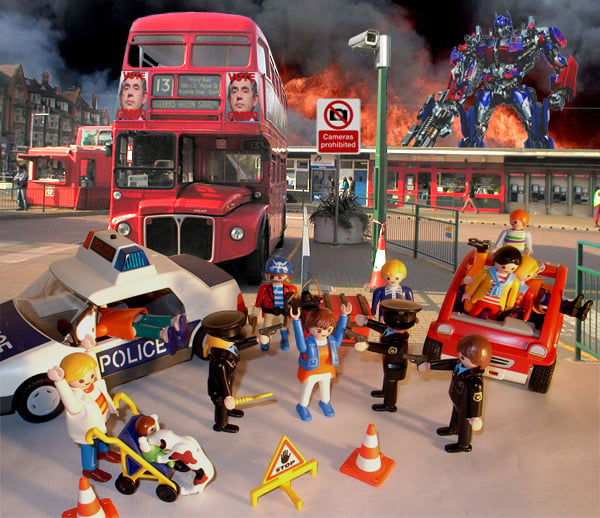
From EPUK we have this one:

From HornCologne.com is this one:

Then there’s this one:

And this one:

And this one:
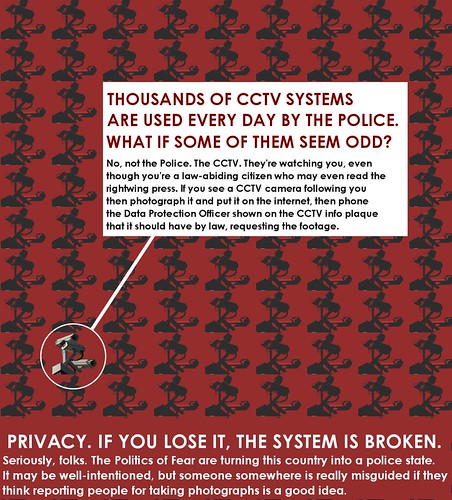
And this one, which also has some very funny comments by people:

And this one:
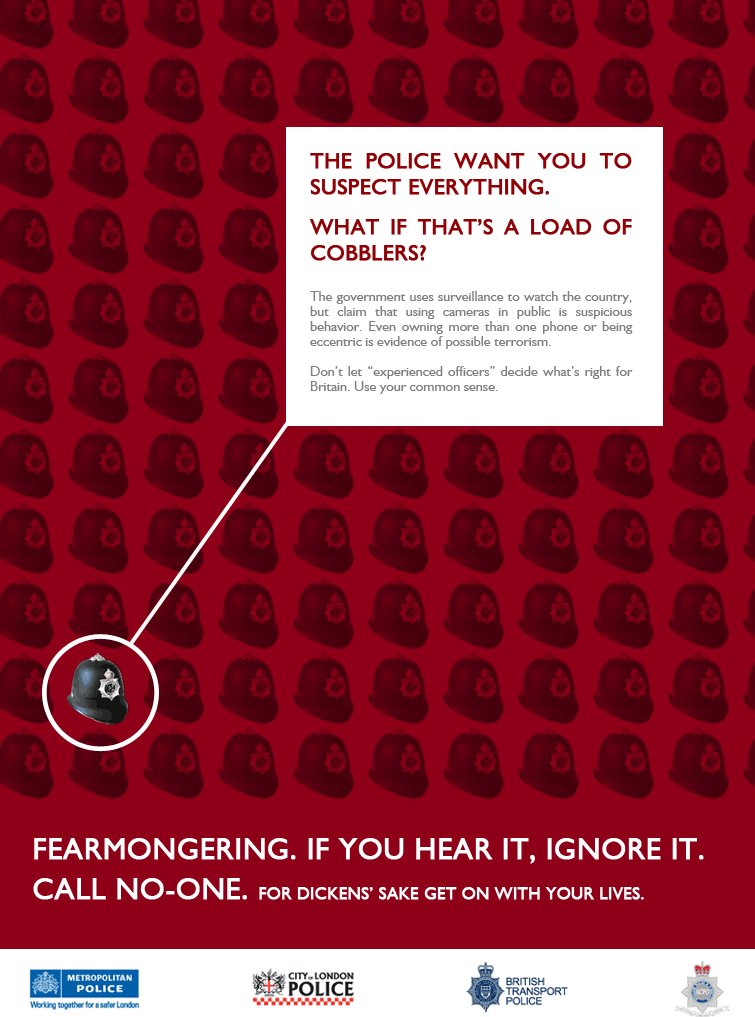
And this one:
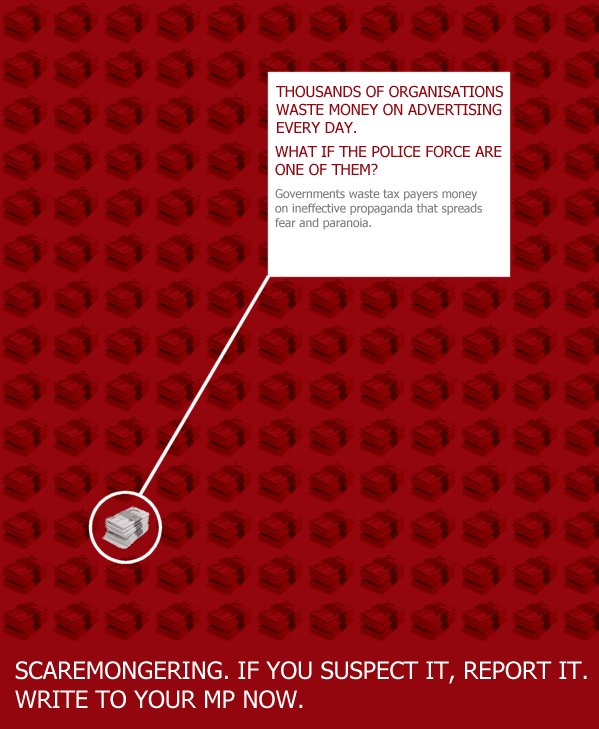
And this one:

And this one:
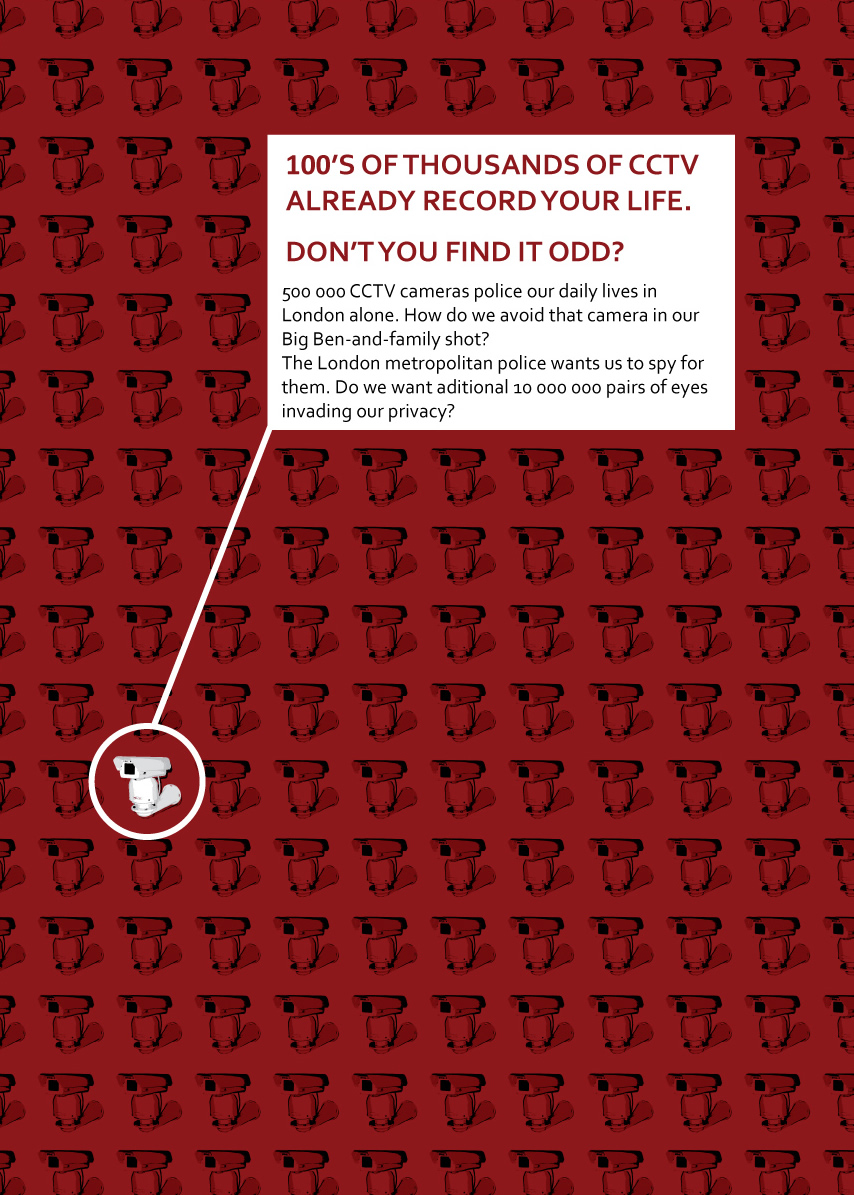
And this one:

And this one:

Lameness at its most suppressing. What qualifications do most Police even have concerning the law? That’s right, none, its a big joke. Nice images by the way.
I don’t know what law qualifications police are required to have.
I think the next step is that the law regarding photography needs to be made clear and articulated to both the police and to the public.
The images are all made by members of the public who have felt motivated enough to respond to this situation.